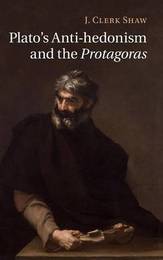
|
Plato's Anti-hedonism and the Protagoras
Hardback
Main Details
| Title |
Plato's Anti-hedonism and the Protagoras
|
| Authors and Contributors |
By (author) J. Clerk Shaw
|
| Physical Properties |
| Format:Hardback | | Pages:232 | | Dimensions(mm): Height 237,Width 160 |
|
| Category/Genre | Western philosophy - Ancient to c 500
Ethics and moral philosophy |
|---|
| ISBN/Barcode |
9781107046658
|
| Classifications | Dewey:184 |
|---|
| Audience | | Professional & Vocational | |
|---|
|
Publishing Details |
| Publisher |
Cambridge University Press
|
| Imprint |
Cambridge University Press
|
| Publication Date |
2 April 2015 |
| Publication Country |
United Kingdom
|
Description
Plato often rejects hedonism, but in the Protagoras, Plato's Socrates seems to endorse hedonism. In this book, J. Clerk Shaw removes this apparent tension by arguing that the Protagoras as a whole actually reflects Plato's anti-hedonism. He shows that Plato places hedonism at the core of a complex of popular mistakes about value and especially about virtue: that injustice can be prudent, that wisdom is weak, that courage is the capacity to persevere through fear, and that virtue cannot be taught. The masses reproduce this system of values through shame and fear of punishment. The Protagoras and other dialogues depict sophists and orators who have internalized popular morality through shame, but who are also ashamed to state their views openly. Shaw's reading not only reconciles the Protagoras with Plato's other dialogues, but harmonizes it with them and even illuminates Plato's wider anti-hedonism.
Author Biography
J. Clerk Shaw is Associate Professor of Philosophy at the University of Tennessee, Knoxville. His articles have appeared in journals including Classical Philology.
Reviews'Shaw's book is clearly structured and regularly informs readers about the intended aims and the results achieved.' Bernd Manuwald, Bryn Mawr Classical Review '... this book deserves careful attention. It offers a combination of close readings of some important passages with an eye to both argumentative structure and dramatic presentation. It also steps back from the minutiae of line-by-line analysis to consider more general questions about how Plato uses these presentations of dialectical encounters to score points against both his sophistic rivals and also the Athenian people more generally.' James Warren, Polis: The Journal for Ancient Greek Political Thought 'Shaw offers an incisive diagnosis of popular double-think, as he calls it, which balances the incoherent complex of commitments to hedonism, to the possibility of akrasia and to the belief that injustice is prudent, i.e. in one's own self-interest to do.' Vanessa de Harven, Notre Dame Philosophical Reviews
|